-
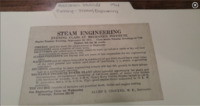 Steam Engineering Class Info
Steam Engineering Class Info Rochester's Mechanics Institute offered practical technical training in a variety of fields. This 1914 pamphlet contains information on evening classes in steam engineering. It informs it's recipient as to the meeting time, the class instructor, and the tuition cost. Take note of most interesting aspect of this pamphlet, the passage that addresses the various types of people who would benefit from the Institute's training. Notice how in addition to students, it also lists engineers, superintendents, machinists, and other professional careers. This attention to training for professionals in the workforce exemplifies the Mechanics Institute's mission of continued learning throughout one's professional life, a mission that they have pursued even 100 years ago.
-
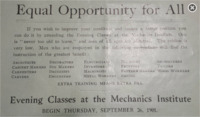 Equal Opportunity For All
Equal Opportunity For All The motto of this advertisement is "never too old to learn", encouraging men of all ages to attend the evening classes. They list a plethora of professions that can benefit from the exposure to a fuller educational experience. An interesting point of the ad was that there is singular mention of men and not women. The Mechanics Institute was clearly not focusing on educating women in 1901. By today's standards it is ironic that the title of this ad is "Equal Opportunity for All".
-
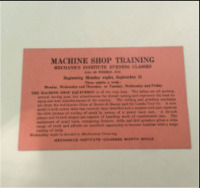 Machine Shop Training - Mechanics Institute Evening Classes
Machine Shop Training - Mechanics Institute Evening Classes This information pamphlet used 1901-1916 advertises the Mechanics Institute's machine shop training evening classes. In addition to the tuition costs and schedules, the pamphlet also describes the quality of the tools available for learners to train with. It uses manufacturer names to assert the pedigree of their facilities, and details the exact specifications of some of the machines, down to the inch. It feels intended to be addressing professionals, and clearly stands as an example of the institute's devotion to continued learning.
-
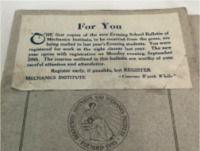 Evening Classes For Men and Women Bulletin
Evening Classes For Men and Women Bulletin This Evening School Bulletin, released between 1901 and 1916, contained information on the year's coming evening courses for men and women. Attached is a note addressed to evening students who had taken classes at the institute the previous year. With the tagline “Courses Worth While”, the note implores students to register early. Depicted on the cover of the bulletin is the emblem of the Rochester Athenaem and Mechanics Institute.
-
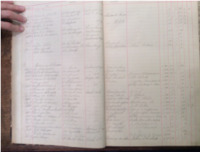 1890-91 Student Employment Records
1890-91 Student Employment Records In the 1890s, potential students had to have their employers or another person vouch for them when they applied to take classes at the Mechanic's Institute. But some people didn't have employers. Children, like nine-year-old Max Adler, could enroll in weekday classes, or in Max's case, weekend classes, like Freehand Drawing. The students' names, employers, ages, occupations, and courses were recorded in student employment records, like this one from 1890-91.
-
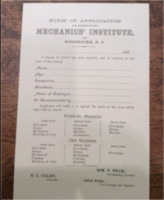 1880s Mechanic's Institute Application
1880s Mechanic's Institute Application While students today can apply to RIT online or via a multi-page paper application, students wishing to apply to take courses at the Mechanic's Institute in the 1880s had only to fill out this single page form with their name, age, occupation, and residence, acquire their employer's (or another respectable individual's) recommendation, and place a "+" next to the day or evening courses they were interested in taking.
-
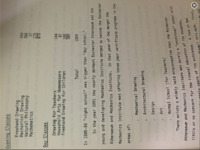 1885-86 Enrollment Statistics, from the Mechanics Institute “Past, Present, and Future”
1885-86 Enrollment Statistics, from the Mechanics Institute “Past, Present, and Future” In 1891 two educational institutions merged to create the Rochester Athenaeum and Mechanics Institute. During its inaugural year, the Institute offered three certificate programs within the fields of mechanical drawing, architectural drawing, art and design. While commonly characterized as a vocational school, the Rochester Athenaeum and Mechanics Institute additionally provided liberal arts education early on.
 Steam Engineering Class Info Rochester's Mechanics Institute offered practical technical training in a variety of fields. This 1914 pamphlet contains information on evening classes in steam engineering. It informs it's recipient as to the meeting time, the class instructor, and the tuition cost. Take note of most interesting aspect of this pamphlet, the passage that addresses the various types of people who would benefit from the Institute's training. Notice how in addition to students, it also lists engineers, superintendents, machinists, and other professional careers. This attention to training for professionals in the workforce exemplifies the Mechanics Institute's mission of continued learning throughout one's professional life, a mission that they have pursued even 100 years ago.
Steam Engineering Class Info Rochester's Mechanics Institute offered practical technical training in a variety of fields. This 1914 pamphlet contains information on evening classes in steam engineering. It informs it's recipient as to the meeting time, the class instructor, and the tuition cost. Take note of most interesting aspect of this pamphlet, the passage that addresses the various types of people who would benefit from the Institute's training. Notice how in addition to students, it also lists engineers, superintendents, machinists, and other professional careers. This attention to training for professionals in the workforce exemplifies the Mechanics Institute's mission of continued learning throughout one's professional life, a mission that they have pursued even 100 years ago. Equal Opportunity For All The motto of this advertisement is "never too old to learn", encouraging men of all ages to attend the evening classes. They list a plethora of professions that can benefit from the exposure to a fuller educational experience. An interesting point of the ad was that there is singular mention of men and not women. The Mechanics Institute was clearly not focusing on educating women in 1901. By today's standards it is ironic that the title of this ad is "Equal Opportunity for All".
Equal Opportunity For All The motto of this advertisement is "never too old to learn", encouraging men of all ages to attend the evening classes. They list a plethora of professions that can benefit from the exposure to a fuller educational experience. An interesting point of the ad was that there is singular mention of men and not women. The Mechanics Institute was clearly not focusing on educating women in 1901. By today's standards it is ironic that the title of this ad is "Equal Opportunity for All". Machine Shop Training - Mechanics Institute Evening Classes This information pamphlet used 1901-1916 advertises the Mechanics Institute's machine shop training evening classes. In addition to the tuition costs and schedules, the pamphlet also describes the quality of the tools available for learners to train with. It uses manufacturer names to assert the pedigree of their facilities, and details the exact specifications of some of the machines, down to the inch. It feels intended to be addressing professionals, and clearly stands as an example of the institute's devotion to continued learning.
Machine Shop Training - Mechanics Institute Evening Classes This information pamphlet used 1901-1916 advertises the Mechanics Institute's machine shop training evening classes. In addition to the tuition costs and schedules, the pamphlet also describes the quality of the tools available for learners to train with. It uses manufacturer names to assert the pedigree of their facilities, and details the exact specifications of some of the machines, down to the inch. It feels intended to be addressing professionals, and clearly stands as an example of the institute's devotion to continued learning. Evening Classes For Men and Women Bulletin This Evening School Bulletin, released between 1901 and 1916, contained information on the year's coming evening courses for men and women. Attached is a note addressed to evening students who had taken classes at the institute the previous year. With the tagline “Courses Worth While”, the note implores students to register early. Depicted on the cover of the bulletin is the emblem of the Rochester Athenaem and Mechanics Institute.
Evening Classes For Men and Women Bulletin This Evening School Bulletin, released between 1901 and 1916, contained information on the year's coming evening courses for men and women. Attached is a note addressed to evening students who had taken classes at the institute the previous year. With the tagline “Courses Worth While”, the note implores students to register early. Depicted on the cover of the bulletin is the emblem of the Rochester Athenaem and Mechanics Institute. 1890-91 Student Employment Records In the 1890s, potential students had to have their employers or another person vouch for them when they applied to take classes at the Mechanic's Institute. But some people didn't have employers. Children, like nine-year-old Max Adler, could enroll in weekday classes, or in Max's case, weekend classes, like Freehand Drawing. The students' names, employers, ages, occupations, and courses were recorded in student employment records, like this one from 1890-91.
1890-91 Student Employment Records In the 1890s, potential students had to have their employers or another person vouch for them when they applied to take classes at the Mechanic's Institute. But some people didn't have employers. Children, like nine-year-old Max Adler, could enroll in weekday classes, or in Max's case, weekend classes, like Freehand Drawing. The students' names, employers, ages, occupations, and courses were recorded in student employment records, like this one from 1890-91. 1880s Mechanic's Institute Application While students today can apply to RIT online or via a multi-page paper application, students wishing to apply to take courses at the Mechanic's Institute in the 1880s had only to fill out this single page form with their name, age, occupation, and residence, acquire their employer's (or another respectable individual's) recommendation, and place a "+" next to the day or evening courses they were interested in taking.
1880s Mechanic's Institute Application While students today can apply to RIT online or via a multi-page paper application, students wishing to apply to take courses at the Mechanic's Institute in the 1880s had only to fill out this single page form with their name, age, occupation, and residence, acquire their employer's (or another respectable individual's) recommendation, and place a "+" next to the day or evening courses they were interested in taking. 1885-86 Enrollment Statistics, from the Mechanics Institute “Past, Present, and Future” In 1891 two educational institutions merged to create the Rochester Athenaeum and Mechanics Institute. During its inaugural year, the Institute offered three certificate programs within the fields of mechanical drawing, architectural drawing, art and design. While commonly characterized as a vocational school, the Rochester Athenaeum and Mechanics Institute additionally provided liberal arts education early on.
1885-86 Enrollment Statistics, from the Mechanics Institute “Past, Present, and Future” In 1891 two educational institutions merged to create the Rochester Athenaeum and Mechanics Institute. During its inaugural year, the Institute offered three certificate programs within the fields of mechanical drawing, architectural drawing, art and design. While commonly characterized as a vocational school, the Rochester Athenaeum and Mechanics Institute additionally provided liberal arts education early on.